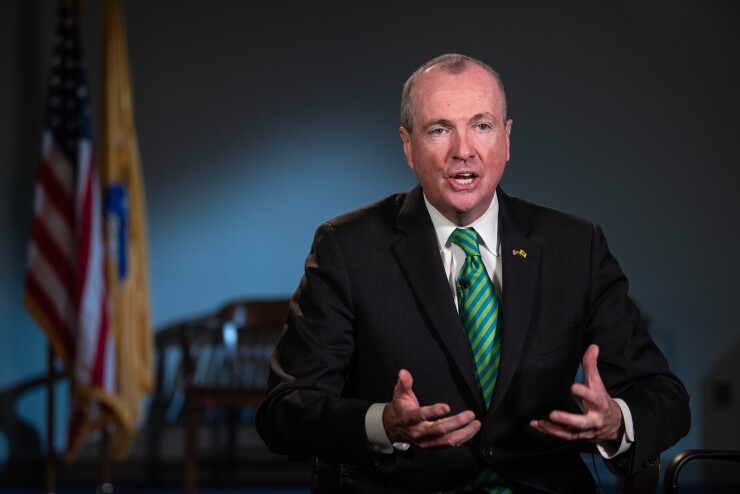New Jersey’s newly proposed fiduciary rule expands the battlefield over which investor advocates and industry trade groups have fought in recent years, extending a fight that has largely taken place in Washington to
The Garden State, which issued its proposal on Monday, suggests that if efforts at the SEC to craft a new standard of conduct are deemed to fall short, then state regulators will move to fill in the gap.
It’s a message Governor Phil Murphy, a Democrat, echoed, touting his administration’s proposal as one “of the strongest investor protections in the nation.”
“At a time when the federal government is undermining the consumer protections implemented in the wake of the 2008 economic crash, we are committed to ensuring our residents and families are protected from predatory financial practices,” Murphy said in a statement.
Advisors and trade groups resist a patchwork of regulations, saying it would limit consumer choice and increase firms’ expenses.
New Jersey’s proposal would require investment professions registered with the state’s regulator to put client interests first when recommending securities or providing investment advice. The rule will be subject to a 60-day public comment period.
“I think it’s a clear message that the SEC has not gone far enough in terms of what it proposed,” says Christine Lazaro, director of the Securities Arbitration Clinic at St. John’s University and current president of PIABA.

New Jersey’s efforts mirror those of Nevada, which has issued a similar proposal that has met with fierce opposition and warnings that brokerage firms
Fiduciary opponents have recently had the momentum. They were successful in scuttling the Department of Labor’s 2016 rule, which survived initial court challenges from lobbying groups but was ultimately
The SEC, meanwhile, has proposed revising standards of conduct for brokers and investment advisors, but the regulator has
FSI, one of several groups to sue the Labor Department over its fiduciary rule, called on New Jersey to wait for the SEC to finalize its Regulation Best Interest.
“State-specific standards will lead to a patchwork of varying requirements across the country, confusing investors and creating uncertainty for advisors who are trying to best serve their clients while also obeying state and federal regulations. These varying standards would also drive up compliance costs for financial advisors, ultimately limiting services or increasing costs for Main Street investors,” David Bellaire, FSI’s general counsel, said in a statement.
For their part, New Jersey regulators say they’re concerned about gaps in the current regulatory framework and investor confusion regarding standards of conduct because brokers can present themselves as financial advisors, yet are not subject to the same fiduciary duty as RIAs.
“The rule we’re proposing codifies a standard that most investors believe they are already receiving from their financial professionals,” Christopher Gerold, chief of the New Jersey Bureau of Securities, said in a statement.
New Jersey’s proposal would allow transaction-based fees provided the fee is reasonable and “the best of reasonably available fee options for the customer,” according to the state. It would require investment professionals to make a reasonable assessment regarding risks, costs and conflicts of interest when making a recommendation or providing investment advice. The proposal would require advice provided to a client be made without regard to financial or other interests of the investment professional.
The proposed fiduciary duty would not be deemed an ongoing obligation, according to the state. Sales contests would be prohibited. And disclosing a conflict of interest would not in and of itself be considered to satisfy the duty of loyalty to the client, according to the state regulator.
If New Jersey or Nevada successfully creates its own fiduciary rule, other states may follow suit — particularly if they find the SEC’s final rule lacking, Lazaro says. “At the end of the day, states won’t sit back if they think the current regulations are not strong enough to protect their citizens.”
Industry executives, speaking at a SIFMA conference in early April, lamented state efforts to jump ahead of the SEC. Susan Axelrod, a former FINRA official
She said FINRA staff “know this industry in and out,” but at the state level, “you don’t find people with the same level of knowledge.” It would be better, she suggested, if they let others take the lead. “Why do the states feel the need to be out there on their own? Why not give the input to the SEC?”
New Jersey, Nevada and other states could prompt the commission not just to take action quicker — but to toughen up its rule proposal.
SEC Commissioner Robert Jackson, speaking in New York hours after New Jersey issued its proposal on April 15, said the investment advice industry requires a long overdue regulatory update because years of evolution had left brokers and advisors under different standards.
“We have a federal system and states can do what they feel they need to do to protect investors in their state. Do I think that if we came out with a strong enough Regulation Best Interest that the states would defer to us? I think they might. But that is on us,” Jackson said.






